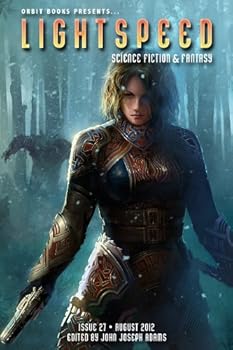These are a few of the online short works we read this week. Our themes this week are libraries and books, mixed with some poison and zombies. As long as we keep the zombies and the poison out of the libraries, it’s all good.

![]() The Fairy Library by Tim Pratt (2013, free on Apex, Kindle magazine issue, also included in Antiquities and Tangibles and Other Stories by Tim Pratt)
The Fairy Library by Tim Pratt (2013, free on Apex, Kindle magazine issue, also included in Antiquities and Tangibles and Other Stories by Tim Pratt)
When I realized I had, coincidentally, read and reviewed two speculative stories this week about books and libraries, I decided to complete the theme with a third. My search for stories with “Library” in their titles on the Free Speculative Fiction Online database yielded some intriguing results. I sampled a few of the stories, and I may follow up on Jorge Luis Borges’ “The Library of Babel” and its SFF offshoots later, but the one that really captured my attention and imagination was The Fairy Library, a long novelette by Tim Pratt.
Emily Yuan has had a very long day at her librarian job, including a sweet old lady trying to steal classical music CDs, kids defacing vampire romance novels with black markers (“I can’t fault their critical acumen, but I disapprove of their methods”), and a vomiting patron. Unfortunately, the day culminated with Emily being laid off from her job due to budget cuts. But a random act of kindness to a stranger at the train platform, sharing a chocolate bar and luring her away from hanging her legs off the edge of the platform, turns into an unexpected boon. The stranger, Mellifera (the name is Greek for “honey-bearing”), offers Emily a job as a librarian at a very strange private library, organizing and cataloging the rare books section.
All sorts of marvelous things happen in a fairy library: the library patrons are all inhuman to one degree or another; characters in books come to life and sit around the library chatting with each other (“I know, it seems tempting to talk to them, but they don’t know anything that’s not in their books”); a staircase always goes down, both ways, because the librarian in that section doesn’t like walking up stairs.
The plot of The Fairy Library isn’t the most compelling; it’s got a little mystery mixed with a bit of romance. But the journey of Emily and her techie roommate Cece, as they explore the mysterious fairy library and try to talk the Victorian-era-minded fairy proprietors into digitizing part of their collection, is at the heart of this story. With its wry humor, imaginative world-building, and love of books ― in more than one way, as is possible in a fairy library ― reading this novelette was an absolute pleasure. ~Tadiana Jones

![]() “The Bookmaking Habits of Select Species” by Ken Liu (2012, free on Lightspeed, Kindle magazine issue) . Nominated for the 2013 Nebula award (short story) and the Sturgeon award.
“The Bookmaking Habits of Select Species” by Ken Liu (2012, free on Lightspeed, Kindle magazine issue) . Nominated for the 2013 Nebula award (short story) and the Sturgeon award.
This short work (I hesitate to call it a “story”) might be a missing page from a future Encyclopedia Galactica, displaced to our day by a fortunate time warp. Every intelligent species in the universe, Ken Liu tells us,
has its unique way of passing on its wisdom through the ages, its way of making thoughts visible, tangible, frozen for a moment like a bulwark against the irresistible tide of time.
Everyone makes books.
The literary practices of five different alien species are examined one by one. For example, the Allatians make phonograph-like recordings that capture the writer’s voice and tone, but are irretrievably damaged each time they are listened to, making them precious beyond measure. To the Tull-Toks, who are beings made of energy, everything in the universe is a literary work:
Each star is a living text, where the massive convection currents of superheated gas tell an epic drama, with the starspots serving as punctuation, the coronal loops extended figures of speech, and the flares emphatic passages that ring true in the deep silence of cold space. Each planet contains a poem, written out in the bleak, jagged, staccato rhythm of bare rocky cores or the lyrical, lingering, rich rhymes—both masculine and feminine—of swirling gas giants.
There’s no real plot, but Liu’s ingenious ideas and luminous descriptive prose nevertheless make this an absorbing read. As I was reading, I tried to anticipate the ways in which other species might express their literary ideas, and each time Liu surpassed my own imagination. There’s a feeling of progression though this story, with concepts that circle back to ideas raised earlier, that rounded it out and gave me a satisfied sense of completion when I reached the end. ~Tadiana Jones
Editor’s note: This story is also discussed in Terry Weyna’s Magazine Monday column about the 2013 Nebula short story nominees, and in Jana Nyman’s and Bill Capossere’s recent reviews of Liu’s The Paper Menagerie and Other Stories.
![]() “Louisa the Poisoner” by Tanith Lee (2011, $2.99 Kindle, $5.95 Audible)
“Louisa the Poisoner” by Tanith Lee (2011, $2.99 Kindle, $5.95 Audible)
I love Tanith Lee’s black sense of humor, and it’s on full display in this novella about a beautiful young woman named Louisa, who was raised in a swamp by an evil witch from whom she learned genteel manners and obtained a bottle of poison. After escaping the witch, Louisa pretends to be a lady, charms her way into the household of an older gentleman, and schemes to methodically cheat his relatives out of their share of his will.
“Louisa the Poisoner” is dark and devilishly funny in that understated way that Tanith Lee is so good at. I loved the audio version read by Janine Haynes, which was released a couple of months ago by Wildside Press. It’s almost 3 hours long. I recommend this version. ~Kat Hooper

![]() “In the House of the Seven Librarians” by Ellen Klages (2006, republished and free on Uncanny Magazine, March/April 2015 issue, Kindle magazine issue, Kindle book)
“In the House of the Seven Librarians” by Ellen Klages (2006, republished and free on Uncanny Magazine, March/April 2015 issue, Kindle magazine issue, Kindle book)
Rounding out my bookish theme this week is this 2006 story by Ellen Klages, which explores the library setting in a somewhat different way than The Fairy Library. This is a whimsical and charming tale, and just a little bit fantastical.
When the forward-looking library board votes to close the old Carnegie Library and replace it with a modern one, its seven librarians decide not to leave. They buy some supplies and quietly lock the door of the library behind them, the woods close in around them, and soon everyone forgets about the old library … except the person who still had a book that was long overdue. The book is left on the library’s doorstep in a wicker basket, along with a baby and a note:
This is overdue. Quite a bit, I’m afraid. I apologize. We moved to Topeka when I was very small, and Mother accidentally packed it up with the linens. I have traveled a long way to return it, and I know the fine must be large, but I have no money. As it is a book of fairy tales, I thought payment of a first–born child would be acceptable. I always loved the library. I’m sure she’ll be happy there.
That was the first time this story made me laugh, but not the last, as the child is raised in the library by seven “feral librarians” and, a little bit, by the library itself, which occasionally gifts the growing girl with a stuffed animal, or hides her when she’s in trouble and doesn’t want to be find.
The ending felt just a tad predictable, but that’s my only complaint. This is a quietly delightful story filled with details that will enchant anyone who loves libraries and classic books, especially if you’ve ever had daydreams about hiding away in the library stacks and making a home there. ~Tadiana Jones
![]() “The Wind Through the Fence” by Jonathan Maberry (2015, $0.99 Kindle, $1.95 Audible)
“The Wind Through the Fence” by Jonathan Maberry (2015, $0.99 Kindle, $1.95 Audible)
This story is about a man who works on a crew that’s building a fence to try to reclaim ground from the zombie hordes that are taking over America. The land has been wasted, there is hardly any food, and there’s nothing left to live for. As they work, among the constant noise of machinery and construction, they can hear moaning and other sounds of death and decay. Scarier than the zombie horde is the theory that one of the crew members has about what those sounds actually mean.
“The Wind Through the Fence” is very similar to the story “Calling Death” that I reviewed a couple of months ago. Both chill-inducing horror stories are teeming with atmosphere and both were originally published in Maberry’s Hungry Tales collection. Tom Weiner does a great job with the narration. ~Kat Hooper





I’m so glad you liked “The Bookmaking Habits of Select Species,” Tadiana!
Kat, I’ve read a few snippets from “Louisa the Poisoner” and thought they were gleefully funny, so I’m not surprised that you loved the audio version. :)
I enjoyed “The House of the Seven Librarians” too. And I want to *work* at the Fairy Library!